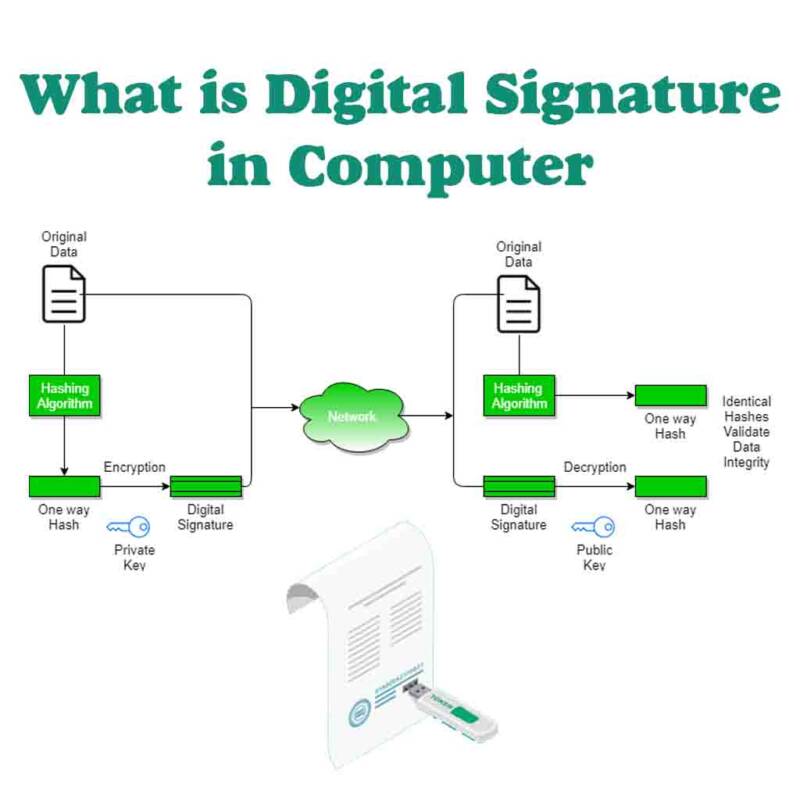
Digital signatures are an important part of modern computer technology, providing a secure and efficient way to authenticate digital documents and ensure their integrity. In this blog article, we’ll explore what a digital signature is, how it works, and why it’s important in the world of computers.
A digital signature is an electronic method of verifying the authenticity of a digital document or message. It’s a type of electronic signature that uses mathematical algorithms to bind a signature to a specific document or message. The digital signature can be used to verify that the message or document hasn’t been altered or tampered with since it was signed, and that the signer is the person they claim to be.
Digital signatures use public-key cryptography, a complex and secure algorithm that involves two keys: a private key and a public key. The private key is known only to the signer, while the public key is made available to anyone who wants to verify the signature.
To create a digital signature, the signer uses their private key to create a unique code that’s associated with the message or document they want to sign. This code is known as a hash. The hash is then encrypted with the signer’s private key, creating a signature that can only be decrypted with the signer’s public key.
To verify the signature, the recipient of the message or document uses the signer’s public key to decrypt the signature and obtain the hash. They then create their own hash of the message or document and compare it to the decrypted hash. If the two hashes match, the signature is valid and the message or document has not been altered since it was signed.
Digital signatures are important for several reasons. First, they provide a way to verify the authenticity of a digital document or message, which is especially important in situations where sensitive information is being transmitted. Second, they provide a way to ensure the integrity of the document or message by detecting any unauthorized changes. Finally, digital signatures are legally binding in many countries and can be used in court as evidence in the event of a dispute.
Digital signatures are an essential tool in the world of computers, providing a secure and efficient way to authenticate digital documents and messages. By using public-key cryptography to bind a signature to a specific document or message, digital signatures help ensure the authenticity and integrity of digital communications. As the world becomes increasingly digital, the importance of digital signatures will only continue to grow.
A. A digital signature in India is an electronic method of verifying the authenticity of a digital document or message. It uses public-key cryptography to create a unique code, known as a hash, that’s associated with the message or document being signed.
A. Digital signatures are mandatory for certain transactions in India, such as filing income tax returns, company registration, and online bidding for government contracts.
A. To obtain a digital signature in India, you need to first obtain a digital signature certificate (DSC) from a licensed certifying authority (CA). You can apply for a DSC online or through authorized registration authorities (RAs).
A. There are three types of digital signatures available in India: Class 1, Class 2, and Class 3. Class 1 is for individuals, while Class 2 and Class 3 are for organizations and individuals who need higher levels of security.
A. Yes, digital signatures are legally binding in India under the Information Technology Act, 2000. They can be used as evidence in court and are recognized by most government agencies and financial institutions.
A. Digital signatures in India provide a way to securely and efficiently sign and authenticate digital documents and transactions. They are also more cost-effective and time-saving compared to traditional paper-based signatures.
A. Digital signatures in India are commonly used for filing tax returns, company registration, e-tendering, e-filing of legal documents, and online banking transactions.
A. Digital signatures in India are highly secure due to the use of public-key cryptography and the regulations put in place by the certifying authorities. However, like any security measure, they can be vulnerable to hacking or other types of attacks if proper precautions are not taken.
This post was last modified on %s = human-readable time difference 12:49 pm
आज के डिजिटल युग में, छोटी-मोटी हिसाब-किताब का काम हमारे हर रोज के काम का हिस्सा बन चुका है। चाहे…
सुकन्या योजना में 14 वर्ष तक ₹250 जमा करेंगे तो 18 वर्ष में कितना मिलेगा? सुकन्या समृद्धि योजना (SSY) भारतीय…
How to whitelist morpho device How to whitelist morpho device : Morpho Device का उपयोग करने के लिए Device को Whitelist…
How to cancel Jio recharge and get refund? Jio is one of the largest mobile network operators in India, providing…
Amazon Franchise Kaise Le? Duniya bhar mein online shopping ka trend tezi se badh raha hai, aur Amazon jaise e-commerce…
In today's fast-paced world, where convenience and accessibility are paramount, it's no surprise that financial services have also evolved to…